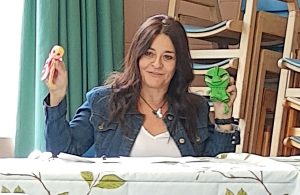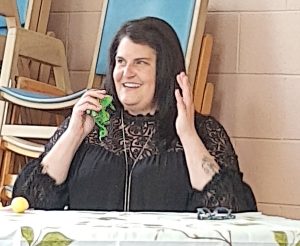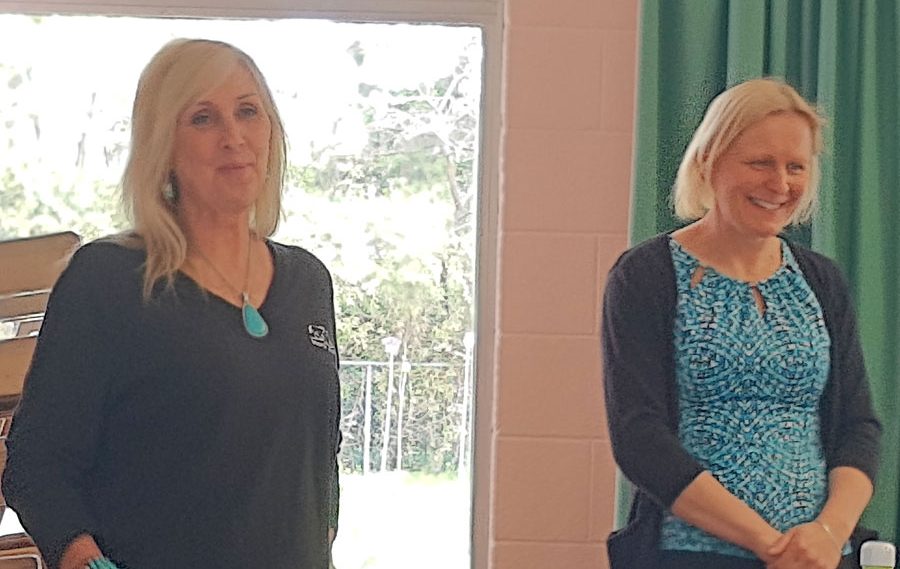GUELPH – The only way the presentation on equine assisted learning could have been better would be if there had been a horse in the room.
But the presenters of a session organized by Recovery Speaking Initiative and offered during sexual assault awareness week made the case that working with horses can help someone overcome past trauma in their lives.
The event, on May 19 at Harcourt United Church in Guelph, featured four speakers: Kristina Karvinen, a researcher at Nipissing University; Lori Burns of Horse Ability; Mena Canonico of Liberty Lanes; and sexual abuse survivor Anne Theriault.
Burns and Canonico talked about the nature of horses and how they can sense people’s energy and moods, and how as pack animals, horses seek out leadership.
“Horses are living bio-feedback machines,” Burns said. “They reflect everything back to us and react to what we are feeling. They can even hear our heartbeat.”
That makes them wonderful creatures to interact with, she said. And it’s during these interactions when a client who has experienced sexual trauma may realize their own state of mind and begin to change.
Therapy involves setting boundaries and building trust, empathy, compassion and, most of all, confidence.

Mena Canonico of Liberty Lanes Retreat Centre in Hockley Valley, uses toys to talk about the positive and negative voices in trauma survivors’ heads. Photos by Joanne Shuttleworth
Canonico said many people who survived sexual trauma have two voices in their heads – a negative gremlin-type voice that reinforces all the negative self-talk that often accompanies abuse, and a positive voice that is more encouraging and forgiving.
Working with horses quiets the negative voice and allows the positive voice to sing, she said.
“With trauma comes shame and the belief you are unlovable. You can’t trust and you can have trouble forming positive relationships,” Canonico said.
“Horses don’t hold on to shame, and they don’t dwell on your trauma. Horses can trust and so can you. That’s the jaw-dropping truth.”
Karvinen was interested in these results but realized there was no real scientific research on the topic, only anecdotal evidence.
So she started a pilot study working with seven clients at Burns’ Horse Ability therapy centre.
While the study sample was small and the results only preliminary, Karvinen said the evidence suggests equine assisted learning does cause positive psychosocial changes in sexual trauma survivors.
The study measured trust, hope and self-esteem before and after going through the eight-week program.
“These seven participants found trust and hope significantly increased, potentially from the program,” she said, adding the preliminary data suggests more study is warranted.
It was Theriault’s talk that set the audience to tears as she talked about being emotionally paralyzed most of her life from childhood sexual abuse.
“Trauma is all you know,” she said, adding she had depression, agoraphobia, and a history of bad relationships.
She read all the textbooks, tried different kinds of therapy, but could not get the gremlin voices out of her head.

Anne Theriault of Fergus found equine assisted learning to be the only way she was able to overcome childhood sexual trauma. Photo by Joanne Shuttleworth
“PTSD (post-traumatic stress disorder) is the war in your head,” she said. “I recognized the patterns but couldn’t overcome it by myself.”
One single session with a horse changed everything however, she said.
She went to Canonico’s farm, Liberty Lane, in Hockley Valley, and one horse approached her and stood just in front of her, a distance away.
“With trauma you never feel safe. But there in the moment I did feel safe. I connected with that horse. And then he walked off and I was changed,” she said.
“Feeling safe is the biggest thing. It was so freeing. I felt a strength I had never felt before.”
If it sounds magical, it was for Theriault too, she said.
A second horse approached her and just put its head in her hands. That sealed the deal for her.
“I found the positive voice (in my head),” she said.
“I knew it was time for me to thrive. I couldn’t get there without the horses.”
She has since bought her own horse and boards it near her home in Fergus.
“I had never been around horses,” she said, still incredulous at the change in her.
“I had lived some dark days, but this has changed me.”
Karvinen said she will continue to study equine assisted learning – with a larger sample of clients and with clients who have experienced other kinds of trauma – to add to her data.
The data will tell its own story, she said, “but anecdotally, it was profound to see the changes that happened. Participants seemed to lighten up and smile more.
“It was tremendous.”




